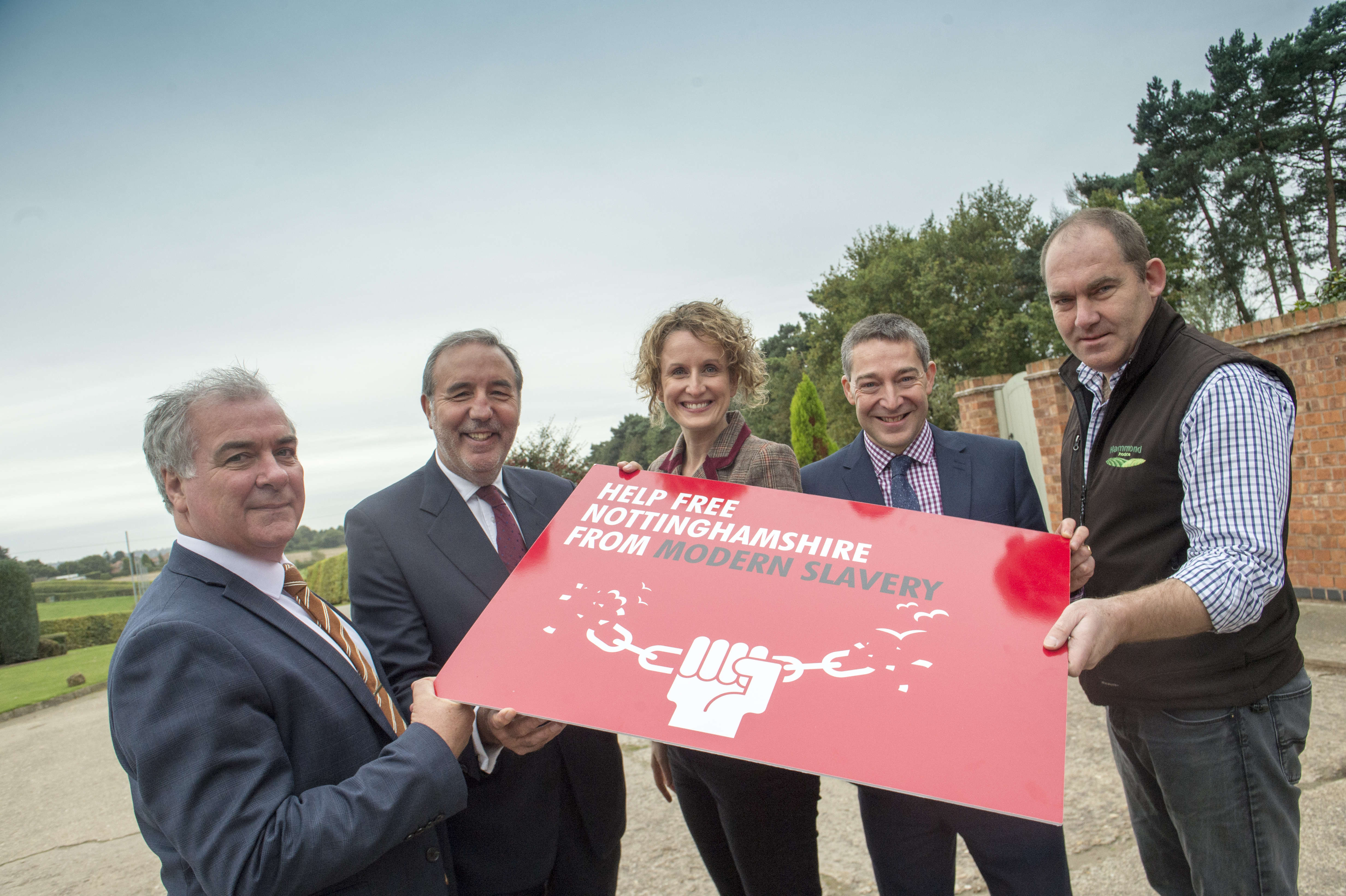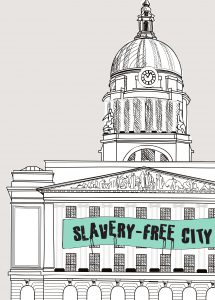
October 19, 2017, by Rob Ounsworth
Nottingham’s pledge: no hiding place here for slavery
Slavery is blighting lives right here in Nottingham. Dr Alison Gardner, of the Rights Lab Beacon of Excellence at the University of Nottingham, on how local agencies have pledged to free the victims of modern slavery ‘hidden in plain sight’ in the city.
A year after the police chief in Nottinghamshire committed to making the county and the city of Nottingham free from slavery, a group of the region’s businesses, churches and charities have pledged to help make this a reality.
There are estimated to be between 10,000 and 13,000 victims of modern slavery and human trafficking across the UK. We don’t yet fully understand how those cases are distributed around the country, but it is clear that official figures for arrests and referrals to the National Referral Mechanism (NRM), the government’s support framework for victims, currently only scrape the surface. In Nottinghamshire, police data shows there were 33 referrals to the NRM in 2016-17, more than double the referrals in 2015-16.
While people may be trafficked from anywhere in the world, modern slavery is also a very local issue. The recent case of Nottinghamshire farmer Jon Hammond is one example. During a casual conversation at an office Christmas party, one of his employees confided to another that he had been trafficked to the UK and was being exploited by his landlord. In June 2017, the landlord was jailed for eight years after admitting to charges of human trafficking and forced labour.
Patterns of exploitation
Slavery can be hidden in plain sight within our workplaces or neighbourhoods, a phenomenon described as “the slave next door” by modern slavery experts Kevin Bales, Professor of Contemporary Slavery and Rights Lab Research Director, and Ron Soodalter.
Patterns of exploitation are sometimes only revealed by unusual or anti-social behaviour in communities, or disclosed through established relationships built on trust. When cases emerge, it is frequently local employers, frontline staff in public services, or voluntary sector organisations that first need to recognise the problem, and signpost victims to appropriate specialised services.
While the government announced £8.5m in 2016 to help enforce its national level Modern Slavery Strategy, there has been little local support available.
 Despite the lack of funding, research that I have been working on with the office of the Independent Anti-Slavery Commissioner has mapped local partnerships being built by numerous police forces, local authorities, faith bodies and non-governmental organisations to tackle modern slavery around the country.
Despite the lack of funding, research that I have been working on with the office of the Independent Anti-Slavery Commissioner has mapped local partnerships being built by numerous police forces, local authorities, faith bodies and non-governmental organisations to tackle modern slavery around the country.
We’re finding that the scope and ambition of the partnerships varies widely. Often they are led by police, but officers admit they are not always best-placed to engage with the groups and individuals they need to reach. In particular, communities vulnerable to trafficking sometimes have an underlying distrust of the police.
In Nottingham and Nottinghamshire, I have been involved in exploring how local civic leadership and community engagement can help make anti-slavery efforts more effective. Building on Bales and Soodalter’s concept of a “slavery-free city”, we have begun to encourage a broader local ownership for the anti-slavery agenda.
In practice this means engaging a variety of local and civic leaders to commit their organisations to raising awareness, training staff, sharing intelligence and supporting victims and survivors. Nottinghamshire’s local modern slavery partnership has already trained hundreds of staff from local public and voluntary sector organisations over the last year in how to spot the signs of slavery.
We are working closely with businesses and the public sector to remove modern slavery from supply chains, and are carrying out ongoing research on the risk of labour exploitation in social care. We are also exploring with local business leaders what their wider contribution to a slavery-free community might be.
This could follow the example of the Co-op’s Bright Future programme, which provides employment opportunities for survivors of slavery. Long-term, we hope the public and private sector can work together to create a more resilient, slavery-free economy.
Social and economic context
A local focus also provides the opportunity to build on different philosophical approaches to anti-slavery work. Modern slavery and human trafficking needs to be seen within the wider social and economic context, such as the effects of capitalism. Church leaders such as Alastair Redfern, Bishop of Derby, argue that society as a whole needs to avoid what Pope Francis termed the “globalisation of indifference” and accept more responsibility for ending slavery.
Working in a local context we have the opportunity to support enforcement of the Modern Slavery Act, but also move beyond this by exploring with local faith groups, businesses and civil society how everyone in Nottinghamshire can respond to slavery by changing their own behaviours. In this way, local action in our communities can also have a global perspective and impact.
Dr Alison Gardner is a Research Fellow and the Slavery-Free City Project Lead of the Rights Lab, which is home to the world’s leading contemporary slavery experts and has built the first large-scale research platform for ending slavery.
This article was first published by theconversation.com/uk
No comments yet, fill out a comment to be the first

Leave a Reply